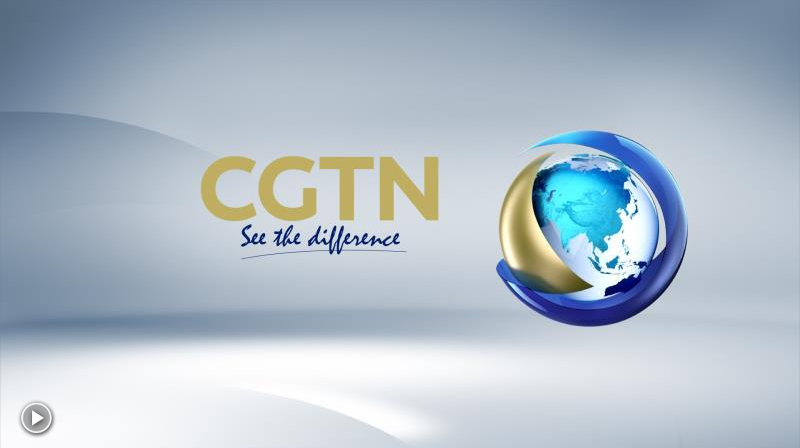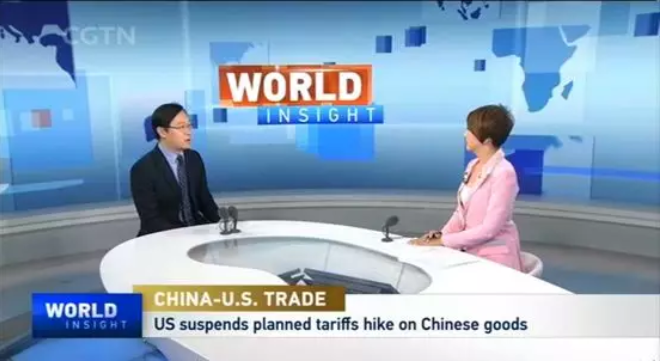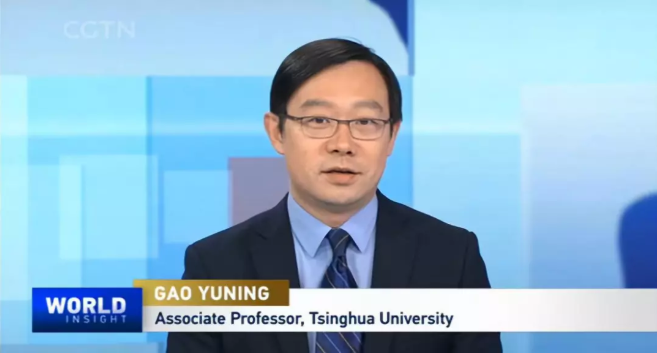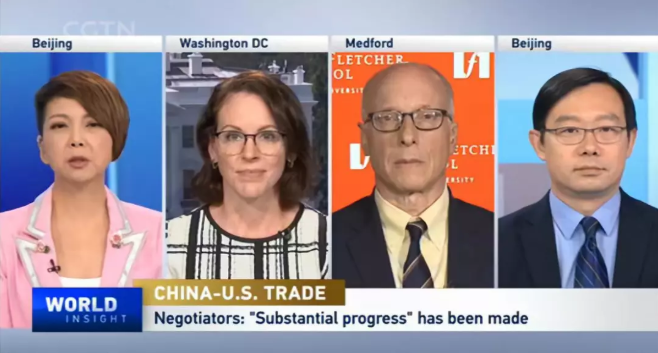


Q: From your perspective, how should we read the statements coming from both sides? For the US side, it’s so called “the first phase”, however from the Chinese side, there is a lack of a specific phase like this. So, what does that mean?
Gao Yuning: I think maybe both sides you support a sustention, but actually, from China side, only written word is guaranteed, so now there is only moderated talk about that. We’re still waiting for if for the next step we can guarantee some agreements between both sides, and that’s actually the thing I think everybody is expecting.
Q: And of course, it needs a lot of works, you know, written down words, that takes a lot of time and also real detailed negotiation. People are talking about in APEC whether two leaders would be able to sign something. Is it too early or too fast, Mr. Gao?
Gao Yuning: I don’t think it’s so called too early, but actually I think it’s expected, because at least, you know, to kick off an agreement is the starting of everything. So now let’s say we have a starting to agree from both sides, that means that’s a correct direction. Both sides working finally has an agreement when the two leaders meet. That means we are preparing for this kind of agreement, so there are a lot of detailed work needed to be done. Actually at least, we have a very good kick-off agreement.
Q: It seems interesting, Mr. Gao, that we are moving the target, because at the very beginning, as Ms. Asthton put, the nature of discussion, at least from the US business perspective, is not necessary about certain areas that become the focus of both the media and public now between the two countries and in terms of the economic ties What goanna happened when tensions being put on by both side to one another at different time and tariff against each other as a result of lack of progress of the negotiations. Are we further away where we started? Will things remain that way or even going further down the road that starts from the very beginning to the new phase?
Gao Yuning: From my perspective, that’s not a diversity by of new target, because we are at “Phase One”, so actually we should do the easiest negotiation first. When you compare the two list of China and US side, the goods from China is quite diversifiable so you can’t find something, just one thing that you can serve as the most important item for the “Phase One”, but from US side, agricultural is the ideal item for the “Phase One” that is clear, straight and very good for negotiation. I thinkthis is actually a good start and we actually kick off that negotiation from agricultural. I think that’s a good kick off. Q: Mr. Gao, Whether some of the fundamental issues regarded by Professor Trachtman are exactly the fundamental issues that are negotiated coming from the US side in the negotiation towards the Chinese team? Because obviously we see quite difference among very different factors inside United States is what is the priority, but eventually you have to negotiate with the negotiation team and you have to deal with the priority that they outline as the priority.Mr. Gao, Whether some of the fundamental issues regarded by Professor Trachtman are exactly the fundamental issues that are negotiated coming from the US side in the negotiation towards the Chinese team? Because obviously we see quite difference among very different factors inside United States is what is the priority, but eventually you have to negotiate with the negotiation team and you have to deal with the priority that they outline as the priorityGao Yuning: I think actually the opening of China’s financial sector is at least as equal important as trade negotiation, or even more important.This is maybe the biggest opportunity for foreign investors, maybe during the past three decades, and now we are welcoming a new three decade. I think not only because the CSRC has these kinds of new rules, but also yesterday our Prime Minister Li Keqiang signed the new rules for the foreign invested insurance companies and commercial banks. Now if you go to check the China’s National Bureau of Statistics, the non-financial proportion of total assert is kind of equal to the financial companies, I think this is the opening up of another half of China, a new china. So, for all foreign investors, they are actually standing in front of the gate of the opening up of the new China just like three decades ago. So, I think this is a kind of biggest thing for all investors.
Q: Mr. Gao, Whether some of the fundamental issues regarded by Professor Trachtman are exactly the fundamental issues that are negotiated coming from the US side in the negotiation towards the Chinese team? Because obviously we see quite difference among very different factors inside United States is what is the priority, but eventually you have to negotiate with the negotiation team and you have to deal with the priority that they outline as the priority.Mr. Gao, Whether some of the fundamental issues regarded by Professor Trachtman are exactly the fundamental issues that are negotiated coming from the US side in the negotiation towards the Chinese team? Because obviously we see quite difference among very different factors inside United States is what is the priority, but eventually you have to negotiate with the negotiation team and you have to deal with the priority that they outline as the priorityGao Yuning: I think actually the opening of China’s financial sector is at least as equal important as trade negotiation, or even more important.This is maybe the biggest opportunity for foreign investors, maybe during the past three decades, and now we are welcoming a new three decade. I think not only because the CSRC has these kinds of new rules, but also yesterday our Prime Minister Li Keqiang signed the new rules for the foreign invested insurance companies and commercial banks. Now if you go to check the China’s National Bureau of Statistics, the non-financial proportion of total assert is kind of equal to the financial companies, I think this is the opening up of another half of China, a new china. So, for all foreign investors, they are actually standing in front of the gate of the opening up of the new China just like three decades ago. So, I think this is a kind of biggest thing for all investors.
Q: Mr. Gao, unpredictability is the key word, I guess, for the negotiations throughout the past fifteen months. For different reasons, I guess, for different sides, for the US side, it’s about whether China has committed to what US believe that China would do, but for the Chinese side, it’s a very different story: whether what is already be committed are going to be done by the US side, whether they would still sign on things that they early have agreed clearly to sign on, whether their negotiator will change and whether the nature of the negotiation will change. So there a lot of variables in the negotiation and unpredictability is the nature of these negotiations, not to mention the nature of the US-China relation. So, in a picture, Mr. Gao, how do you see the US-China trade will bring in for the immediate future for example before the election season in the United States? More predictability or more unpredictability? Its impact on the rest of the relationship would be more positive or not necessarily?
Gao Yuning: I can touch this question from two points. The first is that, the cultures of negotiation from the both sides are quite different. Chinese would like to start with the easiest things first but the US don’t think so, But I think for the long run, even the trade itself is not a certain issue, we should remember that between US-China side,there is still a large amount of revenue from the US companies who sell their product inside China. That’s also, you know, an even bigger number than they directly export to China. So, I think actually for the future, even the trade itself is fluctuant, but there is something more important to guarantee the both sides relationship, hence some fundamental guarantee.Q: As for the immediately effect on global supply chain because of US-China uncertainty relationship, Mr. Gao, what do you think about that global supply chain? I know you are being doing research about that for some quite time.Gao Yuning: Yes, for the uncertainty about the trade negotiation, if that’s a medium term or long-term change. I think that’s a kind of ok for the multination companies, but now, we see that for example the policy to the entity list and something like that actually size the global supply chain certainly and that actually no multination company can carry that kind of sudden change. So, I think for the US and China which are the largest and second largest economy of the world,we actually have the responsibility to guarantee the global supply chain will not be suddenly stopped and to guarantee that multination companies can have a trusted environment.

10月16日,清华大学公共管理学院华宇讲席副教授、国情研究院副研究员高宇宁做客CGTN世界观察(World Insight)栏目,就中美贸易谈判最新进展与栏目主持人田薇进行了探讨。参与访谈的嘉宾还有:来自华盛顿的美中商会商业咨询服务主管Anna Ashton女士,和来自梅德福的塔夫茨大学弗莱彻法学院Joel Trachtman教授。




